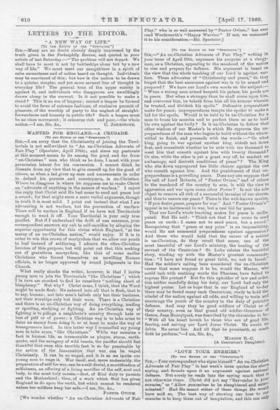WANTED FOR ENGTJA.ND,—A CRUSADE.
[To TUN EDTTOM, OW TRIM " EIWZOTAT0101
Sitt,I am sorry that the Christianity of joining the Terri- torials is not self-evident to "An un-Christian Advocate of Fair Play" (Spectator, April 10th); and since my pastorate at this moment seems to lie among the good and far from "ma-Christian" men who think aa he does, I must with your permission labour for his conversion. I cannot think he dissents from my view that to give oneself up for the good of others, as when a lad gives up ease and amusements in order to defend his parents and countrymen, is un-Christian. Where he disagrees is where he supposes me to make Christ an "advocate of anything in the nature of warfare." I reject the reply that Christ said He had come to send not peace but a sword; for that might seem a mere verbal argument, though in truth it is most solid. I point out instead that what I am advocating is not warfare, but the prevention of warfare. There wi// be warfare in England if we have not Territorials enough to ward it off. Your Territorial is your only true pacifist. But if I understand the drift of one sentence, your correspondent answers my call to self-sacrifice by alleging the superior opportunity for this virtue which England, "at the mercy of an ma-Christian nation," would enjoy. If it is in order to win this crown of martyrdom that we allow our youth to loaf instead of soldiering, I admire the ultra-Obiietian heroism of this purpose, but will point out that this seeking out of gratuitous martyrdom, like that of some earlier Christians who forced themselves on unwilling Roman officials, is no longer approved by sound judgments in the Church.
What really shocks the writer, however, is that I invite young men to join the Territorials "like Christians "; which I in turn am shocked to find he considers "nothing short of blasphemy." But why P Christ came, I think, that the Word might be made flesh : He entered into all that is flesh, that is to say, human; not into men's beliefs only but their business, not their worehips only but their wars. There is a Christian and there is an un-Christian way of doing everything, trading or sporting, studying or fighting. An un-Christian way of fighting is to pillage a neighbour's country through bate or lust of pelf or of power; a Christian way is to take arms to deter an enemy from doing it, or at least to make the way of transgressors hard. In this latter way I counselled my young men to take arms, "like Christians." While war remains a fact in human life, as irremovable as plague, storm, earth- quake, and the savagery of wild beasts, the pacifist should feel thanlcful tlutt even this terrible fact is so far penetrable by the :lotion of the Incarnation that war can be waged Christianly. It can be so waged, and it is so we invite our young men to wage it. War itseLf, and, more undeniably, the preparation of self for war, can be a self-denial, a mortification of selfishness, an offering of a living sacrifice of the self, soul and body, to the most holy causes,—first, of filial duty to parents and the Motherland; then, of a work which God has given England to de upon the earth, but which cannot be rendered unless her soldiers keep her safe.—I am, Sir, &c., PASTOR OPIUM. [We wonder whether "An un-Christian Advocate of Fair Play," who is so well answered by "Pastor Ovium," has eyer read Wordsworth's "Happy Warrior." If not, we oornmend it to his consideration.—En. Spectator.]






































 Previous page
Previous page